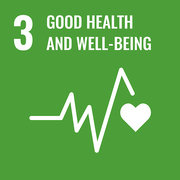
BRCA gene mutations: not only breast and ovarian cancer
Mutations in the BRCA1 and BRCA2 genes are mainly known to significantly increase the risk of developing breast and ovarian cancer in carrier families. This knowledge has also made it possible to implement appropriate screening programmes to prevent these cancers. However, it has not been known so precisely whether the same mutations increase the risk of developing other types of cancer.
In order to plan possible prevention strategies and to provide appropriate genetic counselling to people at higher risk, the research team coordinated by Laura Ottini of the Department of Molecular Medicine of Sapienza University of Rome, in collaboration with the University of Cambridge and the international consortium CIMBA (Consortium for Investigators of Modifiers of BRCA1/2), has investigated and refined risk estimates for cancers associated with mutations in BRCA genes in both sexes. The study results, also supported by the Fondazione AIRC per la Ricerca sul Cancro, were published in the Journal of Clinical Oncology.
"The analyses were carried out on an international cohort of 3,184 families with BRCA1 mutations and 2,157 families with BRCA2 mutations," says Valentina Silvestri of the Department of Molecular Medicine, first co-author of the study. "The case series is the largest currently available in the world and has allowed us to accurately estimate the extent to which an inherited mutation in BRCA1 or BRCA2 is associated with the risk of developing 22 different types of cancer, even taking into account age and sex."
The results show that cancers associated with BRCA1 and BRCA2 also include prostate, pancreatic and stomach cancer, as well as breast and ovarian cancer. Associations with other cancers suggested by previous studies, including melanoma, were excluded.
From the data, researchers estimated that men who carry a mutation in BRCA2 have a risk of about 27% of developing prostate cancer before the age of 80, more than twice as high as non-carriers. In contrast, mutations in BRCA1 are not associated with an increased risk of prostate cancer.
"Having a defective copy of BRCA1 or BRCA2 doubles the risk of pancreatic cancer in both sexes," explains Laura Ottini, co-last author. "Furthermore, we found that mutations triple the risk of stomach cancer in both men and women, although the number of patients in the dataset was rather limited due to the rarity of this form of cancer."
Mutations in both genes significantly increase the risk of breast cancer in men, although this disease is very rare. In particular, while a mutation in BRCA1 increases a man's lifetime risk of developing breast cancer by about four times, a mutation in BRCA2 increases this risk by about 40 times.
These results underline the usefulness of extending genetic testing for BRCA mutations to a wider audience, including both women and men," Ottini concludes. "The estimates we have provided in this study clarify the link between BRCA mutations and cancer risk and will form the basis for the development of increasingly effective sex-specific prevention guidelines to ensure the best clinical management for all patients and their families."
References:
Cancer Risks Associated With BRCA1 and BRCA2 Pathogenic Variants Shuai Li, Valentina Silvestri, Goska Leslie, Timothy R. Rebbeck, Susan L. Neuhausen, John L. Hopper…… Laura Ottini and Antonis C. Antoniou - Journal of Clinical Oncology. DOI: 10.1200/JCO.21.02112
Further Information
Laura Ottini
Department of Molecular Medicine
laura.ottini@uniroma1.it
